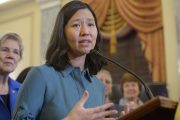
Virginia’s Republican Governor Glenn Youngkin vetoed 30 gun-control bills on Tuesday, signed into law two gun-control bills that have little consequence, and sent back six others with amendments for the state’s Legislature to consider.
Behind the flurry of bills the Democrats dumped on his desk is the real story: the hyper-partisanship that divides the two parties on the issue of gun ownership in Virginia, which is reflective of the country’s hyper-partisanship on the same issue.
In Youngkin’s first term, the Virginia legislative bodies — the House of Delegates and the Senate — were quiescent on the issue of gun control. But once Democrats took control of both bodies — by just one vote — the avalanche of anti-gun bills poured out, all of them along strictly party lines.
It’s really the first time that Youngkin had the opportunity to flex his Second Amendment muscles and reveal that he would be keeping his promises to support it and the Constitution.
Said Youngkin in announcing his vetoes:
I swore an oath to defend the Constitution of the United States of America and the Constitution of Virginia, and that absolutely includes protecting the right of law-abiding Virginians to keep and bear arms.
I am pleased to sign four public safety bills which are commonsense reforms with significant bipartisan support from the General Assembly, and offer recommendations to several bills which, if adopted, will make it harder for criminals to use guns in the commission of a violent act.
He then posted a link to the details behind each of his vetoes of the bills the Democrats had passed.
One of the bills Youngkin signed into law will hold parents responsible if they willfully allow their child access to a firearm knowing their child poses a “credible” threat of violence, while the other bans the purchase or possession of an “auto sear” — a device that can turn a semi-automatic firearm into a fully automatic machine gun.
The bills that were offered and vetoed included a ban on the sale, purchase, and possession of any semi-automatic firearm; restrictions on magazine capacities; extension of the three-day waiting period after gun purchases to five days; a ban on guns on college campuses; a requirement for citizens applying for a concealed-carry permit to provide their fingerprints; a prohibition on selling guns from a home less than 1½ miles from an elementary or middle school; and the elimination of certain private gun-training programs in favor of a state-operated one. Other bills would require that all firearms at home be kept in a locked container when there is a child present, and would prohibit the possession of a firearm within 100 feet of a polling place, up from the current limit of 40 feet.
A spokesman for the National Rifle Association’s legislative and political action arm, its Institute for Legislative Action, called Youngkin’s vetoes “courageous”:
Governor Glenn Youngkin’s courageous veto of dozens of ill-conceived gun control bills is a resounding victory for the Second Amendment in Virginia. His refusal to bow to unconstitutional overreach — stopping widespread bans on semi-automatic firearms, blocking ill-conceived laws like arbitrary waiting periods, and unjust age restrictions — underscores his fierce commitment to safeguarding our fundamental rights.
But what if that “unconstitutional overreach” is the national policy of the Democratic Party? What if they care not a whit about constitutional limitations, common sense, history, or Supreme Court rulings? What if they are so bound to follow their agenda that none of this causes them to pause?
The word “radical” is defined by Merriam-Webster dictionary as “advocating extreme measures to [change] a political state of affairs.” That is certainly a reasonable appellation to apply to the Democratic Party in Virginia, and one that also applies to the Democratic National Committee, which continues to dictate its radical agenda to Democratic Parties in the state legislatures.




